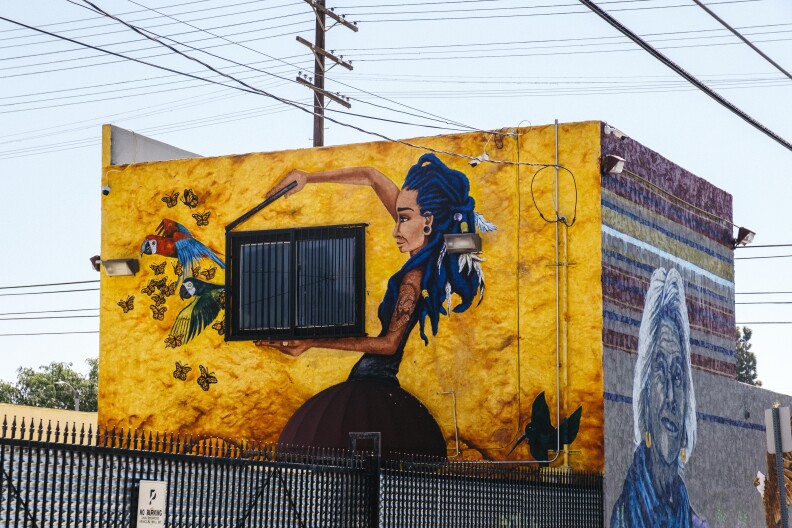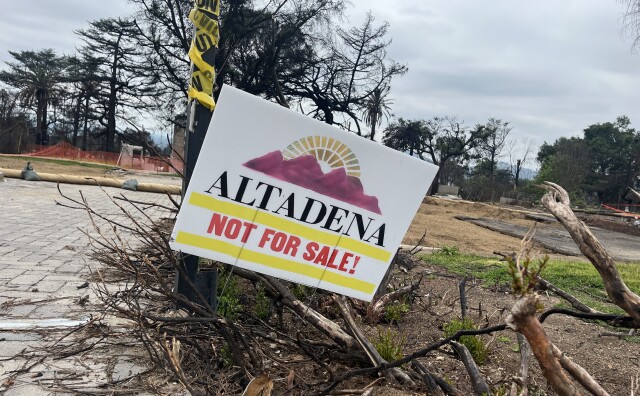Congress has cut federal funding for public media — a $3.4 million loss for LAist. We count on readers like you to protect our nonprofit newsroom. Become a monthly member and sustain local journalism.
Morning Brief: Your Vaccine Questions, Free Cell Phones, And Legendary LA Muralists

Good morning, L.A. It’s April 22.
Every day, our newsroom’s call-in show, AirTalk, welcomes a physician to answer listeners’ questions about COVID-19 and the vaccine. Earlier this week, host Larry Mantle spoke with Dr. Dean Blumberg, a professor of medicine and the chief of pediatric infectious diseases at U.C. Davis Children's Hospital. Here are some of the questions he got, and his answers. (The conversation has been edited for length and clarity):
It would appear we're going to be awash in vaccines pretty soon. Are we close to having vaccines with no takers?
Yes, that's what the models suggest. We know that there was a lot of demand for vaccines at the beginning, and we also know that there are still people who are vaccine-hesitant, or really anti-vaccine. As the people who want the vaccine get vaccinated, there eventually will be more vaccine available than people demand.
This is going to be the more challenging part of the vaccine delivery — really trying to convince those who are hesitant or reluctant to be vaccinated that we do have safe and effective vaccines.
The U.S. State Department has put out a travel warning for something like 80% of the world because of COVID-19 outbreaks. Do you think that that is medically justified?
-
This is the web version of our How To LA newsletter. Sign up here to get this newsletter sent to your inbox each weekday morning
Yes. Worldwide, we're seeing spikes in so many countries now. The U.S. is in a relatively good place, along with other countries such as the U.K., Taiwan, Iceland. But there's just a handful of countries that have really done well controlling transmission.
There's a lot less COVID-19 around us, but it's still there, and we’re trying to understand the variants. What would you say to people who still have the perception that they're taking their life in their hands when they step outside their home?
Well, I don't think we're ever going to get to zero risk. And so we’re going to need to get to the understanding that everybody has different risk tolerances. We've all been hyped up to be scared of being with people without wearing a mask. Or, if somebody coughs, it makes us nervous. So as we get more people vaccinated and return to normality, we are going to go back to some socializing, some large gatherings in person, eventually we're going to not be masking in public, and I think that's going to be an adjustment for everybody.
It can be done gradually. It doesn't have to be all at once. We don't have to all rip off our masks and be in a stadium with 100,000 other people.
We've trained ourselves to have that kind of visceral response to the risk. It's going to take a long time, I think, to get out of that immediate response.
Oh, I fully understand that, and I've experienced that myself. And so I think people need to be generous with themselves, be forgiving with themselves and just really take small steps and not try to change everything at once. This last year we've been through an awful lot with changing our norms.
Keep reading for more on what’s happening in L.A. today, and stay safe out there.
What Else You Need To Know Today
- LAUSD Superintendent Austin Beutner will step down when his contract expires in June.
- Here's how to schedule a new vaccine appointment if yours was canceled Tuesday.
- L.A. Mayor Eric Garcetti introduced an $11.2 billion spending plan for the next fiscal year, but a federal judge’s order may throw a wrench in the part about homelessness.
- To make sure unhoused Angelenos are able to return for their second vaccine, health officials are providing cell phones.
- Some Cal State employees are worried about what they see as a patchwork approach to vaccine rules.
Before You Go … LA Muralists Sonia Romero And Kristy Sandoval Paint The Future

As two of the most celebrated and prolific muralists in L.A., a city that ranks alongside Buenos Aires, Melbourne, New York City and Montreal as one of the mural capitals of the world, Romero and Sandoval join a legacy of trailblazers who put this city's street art on the map.
-
Got something you’ve always wanted to know about Southern California and the people who call it home? Is there an issue you want us to cover? Ask us anything.
-
Have a tip about news on which we should dig deeper? Let us know.
As Editor-in-Chief of our newsroom, I’m extremely proud of the work our top-notch journalists are doing here at LAist. We’re doing more hard-hitting watchdog journalism than ever before — powerful reporting on the economy, elections, climate and the homelessness crisis that is making a difference in your lives. At the same time, it’s never been more difficult to maintain a paywall-free, independent news source that informs, inspires, and engages everyone.
Simply put, we cannot do this essential work without your help. Federal funding for public media has been clawed back by Congress and that means LAist has lost $3.4 million in federal funding over the next two years. So we’re asking for your help. LAist has been there for you and we’re asking you to be here for us.
We rely on donations from readers like you to stay independent, which keeps our nonprofit newsroom strong and accountable to you.
No matter where you stand on the political spectrum, press freedom is at the core of keeping our nation free and fair. And as the landscape of free press changes, LAist will remain a voice you know and trust, but the amount of reader support we receive will help determine how strong of a newsroom we are going forward to cover the important news from our community.
Please take action today to support your trusted source for local news with a donation that makes sense for your budget.
Thank you for your generous support and believing in independent news.

-
Experts say students shouldn't readily forgo federal aid. But a California-only program may be a good alternative in some cases.
-
The program is for customers in communities that may not be able to afford turf removal or water-saving upgrades.
-
More than half of sales through September have been to corporate developers. Grassroots community efforts continue to work to combat the trend.
-
The bill would increase penalties for metal recyclers who possess or purchase metal used in public infrastructure.
-
The new ordinance applies to certain grocers operating in the city and has led to some self-checkout lanes to shutter.
-
Children asked to waive right to see a judge in exchange for $2,500







